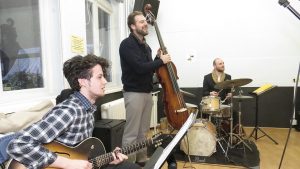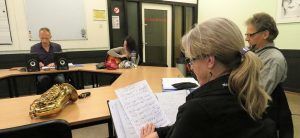Below you find an overwiew of all subjects of the DJAM curriculum.
Combo
Combo lessons form the heart of the DJAM curriculum. Here you apply skills learned in other classes through improvisation, ensemble playing, and studying pieces and arrangements. Communication and attentive listening—to yourself and others—are central.
Combos consist of small groups. We aim to avoid instrument overlap; we never place two drummers or bassists in the same group.
In levels 1 and 2, you also work with specially composed pieces tailored to your level of ear training and theory skills.
To participate in a combo, you must have sufficient technical ability on your instrument. If not, you can begin with Main Subject lessons, optionally combined with Supporting Subjects.
ℹ️ In some cases, Main Subject Lessons are required to join a combo or to be placed in a higher combo level.

You’ll have access to play-along files (part of DJAM’s lesson materials) and recommended recordings via the DJAM student website.
Combos perform during the New Year’s Concert and the Open House /Closing Concert.
Lesson duration
- Level 1 & 2: 1 lesson of 90 minutes per week
- Level 3: 1 lesson of 135 minutes per week
- Advanced level: 1 lesson of 180 minutes per week
Watch performances of diverse DJAM combos here.
Supporting Subjects (theoretical and practical)
Alongside combo lessons, DJAM offers a wide range of Supporting Subjects. These help you better understand what you’re playing and strengthen your musical ear, rhythmic sense, improvisation skills, and theoretical knowledge.
Lessons are taught using your primary instrument (or voice, for vocalists), creating a strong connection to practical musicianship.

Support 1 (Levels 1-3, Basic Subjects)
Level 1 to 3 is our basic training. Here music theory is divided into 5 different subjects (harmony, improvisation, ear training, rhythm and APM).
- Theory
Understand how music is constructed. Topics: intervals, scales, keys, and chords. At higher levels: step analysis, voice leading, and chord extensions.
Duration: 1 lesson of 50 minutes every two weeks - Improvisation
Learn to improve melodic, harmonic, and rhythmic soloing. Focus on phrasing, variation, and practical application of theory.
Duration: 1 lesson of 50 minutes every two weeks - Rhythm
Perform, notate, and improvise rhythms, both vocally and instrumentally. Timing, swing feel, and stylistic awareness are key.
Duration: 1 lesson of 50 minutes every two weeks - Ear-training
Train to recognize and reproduce intervals, scales, chords, melodies, etc. Basic piano or guitar skills are required for self-checking.
Duration: 1 lesson of 50 minutes every two weeks - APM (Applied Practical Modules)
Modules to enhance practical skills: II–V–I progressions, solo practicum, blues, guide-tone lines, big band, and more. Listening-focused modules include “Listening to Jazz” and “Jazz History.”
APM is divided over 3 years, with varying content. Some modules repeat (with different materials), others rotate. Completing 3 years covers the full APM program.
Duration: 1 lesson of 60 minutes per week
Materials
Accompanying audio files and books are available as part of the study materials, many of which can be downloaded from the student site.
Requirements for Support 1:
- A chord instrument
Pianists, guitarists, and accordionists are already equipped; others are expected to acquire a keyboard or piano before the course begins. - Basic knowledge of music notation
No notation knowledge yet? Take the Reading Music Preparatory Course (3 lessons of 60 minutes) in July, August, or September before the school year starts.
ℹ️ Some classes will only start with enough registrations.
Support 2 (Advanced, Extended Subjects)
After completing Support Level 1, you can progress to:
- Arranging
Learn to harmonize melodies for ensembles. Topics: instrumentation, voicing, fills, counterpoint, and reharmonization.
Duration: 1 lesson of 100 minutes every two weeks - Composing
Develop your own jazz and pop compositions. Focus: form, chord progressions, melody, climax, and stylistic characteristics.
Duration: 1 lesson of 100 minutes every two weeks
ℹ️ Take Arranging before Composing, so you can arrange your own work and develop deeper harmonic insight.
Requirements for Support 2:
- Sufficient theoretical knowledge
– Current DJAM students: Completed Theory 3 (or enrolled), Ear Training 2 and Rhythm 2 completed.
– New students: Entrance exam shows equivalent theory to DJAM Theory 3, and skills comparable to completed Level 2 in Ear Training and Rhythm. - Sufficient skills on piano or guitar
Able to play chords and melodies at a slow tempo. - Proficiency with notation software
Able to work with programs like Sibelius, Finale, Dorico, or MuseScore.
main subject Lessons
These are individual weekly lessons focused on your main instrument or voice. They complement other courses and support your overall musical development. Main Subject lessons are available for all instruments.
Duration: 1 lesson of 45 minutes per week
Subjects per week and level
There are three different lesson packages per level, varying in course content and duration. Main Subject lessons are offered separately from these packages.
| Subject
Level |
Combo | Theory | Improvisation | Rhythm | Ear- training |
Composing/ arranging |
APM | Main subject |
| I | ||||||||
| II | ||||||||
| III | ||||||||
| Advanced | ||||||||
